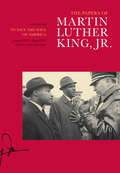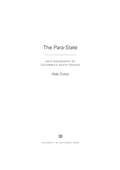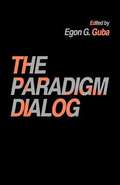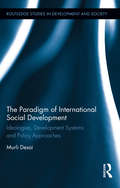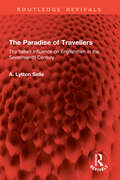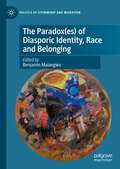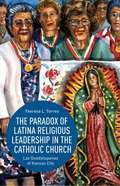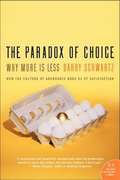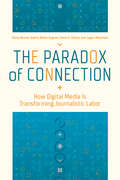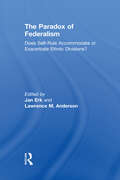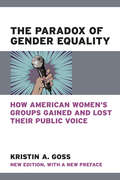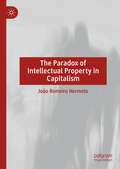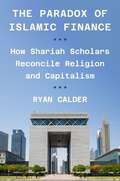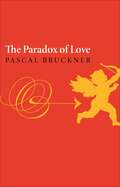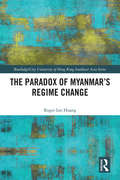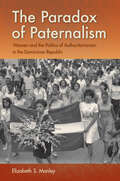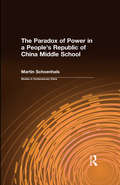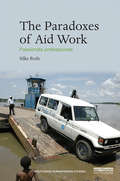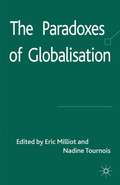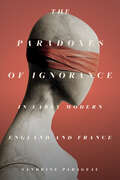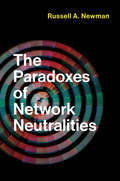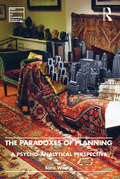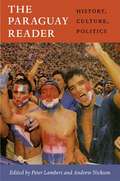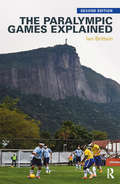- Table View
- List View
The Papers of Martin Luther King, Jr., Volume VII: To Save the Soul of America, January 1961–August 1962 (Martin Luther King Papers #7)
by Martin Luther King Jr.Preserving the legacy of one of the twentieth century’s most influential advocates for peace and justice, The Papers of Martin Luther King, Jr., is described by one historian as being the "equivalent to a conversation" with King. To Save the Soul of America, the seventh volume of the anticipated fourteen-volume edition, provides an unprecedented glimpse into King’s early relationship with President John F. Kennedy and his efforts to remain relevant in a protest movement growing increasingly massive and militant. Following Kennedy’s inauguration in January 1961, King’s high expectations for the new administration gave way to disappointment as the president hesitated to commit to comprehensive civil rights legislation. As the initial Freedom Ride catapulted King into the national spotlight in May, tensions with student activists affiliated with the Student Nonviolent Coordinating Committee (SNCC) were exacerbated after King refused to participate in subsequent freedom rides. These tensions became more evident after King accepted an invitation in December 1961 to help the SNCC-supported Albany Movement in southwest Georgia. King’s arrests in Albany prompted widespread national press coverage for the protests there, but he left with minimal tangible gains. During 1962 King worked diligently to improve the effectiveness of the Southern Christian Leadership Conference (SCLC) by hiring new staff and initiating grassroots outreach. King also increased his influence by undertaking an overcrowded schedule of appearances, teaching a course at Morehouse College, and participating in an additional round of protests in Albany during July 1962. As King confronted these difficult challenges, he learned valuable lessons that would later impact his efforts to desegregate Birmingham, Alabama, in 1963.
The Para-State
by Aldo CivicoSince its independence in the nineteenth century, the South American state of Colombia has been shaped by decades of bloody political violence. In The Para-State, Aldo Civico draws on interviews with paramilitary death squads and drug lords to provide a cultural interpretation of the country's history of violence and state control. Between 2003 and 2008, Civico gained unprecedented access to some of Colombia's most notorious leaders of the death squads. He also conducted interviews with the victims of paramilitary, with drug kingpins, and with vocal public supporters of the paramilitary groups. Drawing on the work of Deleuze and Guattari, this riveting work demonstrates how the paramilitaries have in essence become a war machine deployed by the Colombian state to control and maintain its territory and political legitimacy.
The Paradigm Dialog
by Egon G. GubaIs scientific positivism, long the reigning paradigm for research in the social sciences, the `best way' to conduct social research? This is the central question examined in The Paradigm Dialog. Recently three key challenges have appeared - positivism, critical theory and constructivism. All three offer researchers new methodological approaches and all three present fundamental questions that must be addressed. Can research be conducted between paradigms? Are they equally useful in answering questions of applied research? What constitutes good or ethical research in each? These and other significant questions are examined by a multidisciplinary group of leading figures in qualitative research.
The Paradigm of International Social Development: Ideologies, Development Systems and Policy Approaches (Routledge Studies in Development and Society)
by Murli DesaiThis book takes a historical approach to analyse ideologies, policy approaches and development systems that have constructed the paradigm of international social development. It aims to review the social construction of "development" by tracing the historical dynamics of the modern ideologies and political economy of industrialization, colonization, the Cold War, and globalisation; to examine the process of reconstruction of development as "social development" based on alternate ideologies and alternate policy approaches and review the roles played by the development systems; and to trace the history of social policy approaches from welfare to rights-based, universal, comprehensive and preventative social policies for social development, and identify the roles played by non-government organizations and the social work profession.
The Paradise of Travellers: The Italian Influence on Englishmen in the Seventeenth Century (Routledge Revivals)
by A. Lytton SellsItaly in the Seicento retained her prestige as the country most advanced in the arts of civilization. She was still, with France, and prior to the formation of the Royal Society, in the van of scientific research. The Academy of St. Luke in Rome was the greatest art school in the world. Scientists like Galileo, historians like Paolo Sarpi, added new lustre to her name. Venice, ‘the eldest child of liberty’ was still glorious and powerful. Thus it was that English students flocked in numbers to Padua and that travellers regarded a sojourn in Italy as the highlight of their experience.First published in 1964, The Paradise of Travellers devotes particular attention to travel books. Not only the records of such celebrated tourists as Fynes Moryson and John Evelyn, but those of many others, equally interesting, are examined. It is shown that, as the century advanced, Englishmen were entertained and even welcomed in Rome by learned ecclesiastics and eminent Cardinals. The Protestant and Catholic worlds were learning the need, and even the charm, of co-existence.
The Paradox (Politics of Citizenship and Migration)
by Benjamin MaiangwaThis book explores how questions about home and belonging have been framed in the discourses on race, migration, and social relationships. It does this with the aim of envisioning alternative modes of living and reimagining our political communities in ways that question the legacy of colonization and constructed identities which detract from our sense of obligation to each other and the planet. The book questions problematic categories of difference to transform human relations beyond the materialism of our global political economy. Questions addressed in the volume include: In what ways are combative colonial identities of difference manufactured within our national and global spaces of encounter? How can we expel the racialized and tribalized political identities that seek to purify and deny the complexities and sacredness of being human? How do we embrace the notion that everyone we encounter is a mirror reflecting our fears of suffering and our desires for happiness?The book is set in the context of re-emerging ultra-nationalists and anti-migrant politicians on the national and international stage, advancing various strands of extreme-right and protectionist ideology couched as redemptive-welfarist strategies. The adverse impacts of these strategies seem to be reifying a possessive idea of citizenship and identity, engendering a national fantasy that portrays communities as homogenous entities inhabiting enclosed borders. This is essentially a compendium of conversations across the intersection of the racial, national, ethnic, spiritual, and sexual boundaries in which we live.
The Paradox Of Latina Religious Leadership In The Catholic Church
by Theresa L. TorresReligion and social action is both empowering and limiting for women. This study shows the Guadalupanas' awareness of themselves as agents for change and their difficulties in understanding and maintaining their limited gendered roles within church and community.
The Paradox of Choice
by Barry SchwartzIn the spirit of Alvin Toffler's Future Shock, a social critique of our obsession with choice, and how it contributes to anxiety, dissatisfaction and regret. This paperback includes a new P.S. section with author interviews, insights, features, suggested readings, and more. Whether we're buying a pair of jeans, ordering a cup of coffee, selecting a long-distance carrier, applying to college, choosing a doctor, or setting up a 401(k), everyday decisions--both big and small--have become increasingly complex due to the overwhelming abundance of choice with which we are presented.We assume that more choice means better options and greater satisfaction. But beware of excessive choice: choice overload can make you question the decisions you make before you even make them, it can set you up for unrealistically high expectations, and it can make you blame yourself for any and all failures. In the long run, this can lead to decision-making paralysis, anxiety, and perpetual stress. And, in a culture that tells us that there is no excuse for falling short of perfection when your options are limitless, too much choice can lead to clinical depression.In The Paradox of Choice, Barry Schwartz explains at what point choice--the hallmark of individual freedom and self-determination that we so cherish--becomes detrimental to our psychological and emotional well-being. In accessible, engaging, and anecdotal prose, Schwartz shows how the dramatic explosion in choice--from the mundane to the profound challenges of balancing career, family, and individual needs--has paradoxically become a problem instead of a solution. Schwartz also shows how our obsession with choice encourages us to seek that which makes us feel worse.By synthesizing current research in the social sciences, Schwartz makes the counterintuitive case that eliminating choices can greatly reduce the stress, anxiety, and busyness of our lives. He offers eleven practical steps on how to limit choices to a manageable number, have the discipline to focus on the important ones and ignore the rest, and ultimately derive greater satisfaction from the choices you have to make.
The Paradox of Choice
by Barry SchwartzIn the spirit of Alvin Toffler's Future Shock, a social critique of our obsession with choice, and how it contributes to anxiety, dissatisfaction and regret. This paperback includes a new P.S. section with author interviews, insights, features, suggested readings, and more.Whether we're buying a pair of jeans, ordering a cup of coffee, selecting a long-distance carrier, applying to college, choosing a doctor, or setting up a 401(k), everyday decisions--both big and small--have become increasingly complex due to the overwhelming abundance of choice with which we are presented.We assume that more choice means better options and greater satisfaction. But beware of excessive choice: choice overload can make you question the decisions you make before you even make them, it can set you up for unrealistically high expectations, and it can make you blame yourself for any and all failures. In the long run, this can lead to decision-making paralysis, anxiety, and perpetual stress. And, in a culture that tells us that there is no excuse for falling short of perfection when your options are limitless, too much choice can lead to clinical depression.In The Paradox of Choice, Barry Schwartz explains at what point choice--the hallmark of individual freedom and self-determination that we so cherish--becomes detrimental to our psychological and emotional well-being. In accessible, engaging, and anecdotal prose, Schwartz shows how the dramatic explosion in choice--from the mundane to the profound challenges of balancing career, family, and individual needs--has paradoxically become a problem instead of a solution. Schwartz also shows how our obsession with choice encourages us to seek that which makes us feel worse.By synthesizing current research in the social sciences, Schwartz makes the counterintuitive case that eliminating choices can greatly reduce the stress, anxiety, and busyness of our lives. He offers eleven practical steps on how to limit choices to a manageable number, have the discipline to focus on the important ones and ignore the rest, and ultimately derive greater satisfaction from the choices you have to make.
The Paradox of Connection: How Digital Media Is Transforming Journalistic Labor
by Diana Bossio Valérie Bélair-Gagnon Avery E. Holton Logan MolyneuxUsing a framework of online connection and disconnection, The Paradox of Connection examines how journalists’ practices are formed, negotiated, and maintained in dynamic social media environments. The interactions of journalists with the technological, social, and cultural features of online and social media environments have shaped new values and competencies--and the combination of these factors influence online work practices. Merging case studies with analysis, the authors show how the tactics of online connection and disconnection interact with the complex realities of working in today’s media environments. The result is an insightful portrait of fast-changing journalistic practices and their implications for both audiences and professional identities and norms.
The Paradox of Federalism: Does Self-Rule Accommodate or Exacerbate Ethnic Divisions?
by Jan Erk Lawrence M. AndersonThe paradox of federalism is about whether self-rule accommodates or exacerbates ethnic divisions. A federal arrangement which formally recognizes ethno-linguistic diversity to help manage divisions can also pave the way for eventual disintegration. The case studies in this book cover a wide geographical basis (Canada, Scotland, Spain, Belgium, Bosnia, Kosovo, Russia, India, and Iraq) and seek to outline under what conditions federalism can deliver its promise of resolving ethnic conflict.The book aims to bridge those who study federalism and decentralization in the developed world and those who study the politics of ethnic divisions in the developing world. We also wanted to bridge the scholarship from the two sides of the Atlantic, as well as the subfields of Comparative Politics, International Relations, and Constitutional Politics. Furthermore, the volume has a number of high-profile senior scholars with name recognition from both sides of the Atlantic.The scope of the volume is wide – historically, methodologically, and geographically; and has relevance for the applied side as well as the theoretical literature. Consequently, we believe this is a timely collection on the high profile topic of Ethnic Conflict/Conflict Resolution.This book was based on a special issue of Regional and Federal Studies
The Paradox of Gender Equality: How American Women's Groups Gained and Lost Their Public Voice (The CAWP Series in Gender and American Politics)
by Kristin A GossKristin A. Goss examines how women’s civic place has changed over the span of more than 120 years, how public policy has driven these changes, and why these changes matter for women and American democracy. As measured by women’s groups’ appearances before the U.S. Congress, women’s collective political engagement continued to grow between 1920 and 1960—when many conventional accounts claim it declined—and declined after 1980, when it might have been expected to grow. Goss asks what women have gained, and perhaps lost, through expanded incorporation, as well as whether single-sex organizations continue to matter in 21st-century America.
The Paradox of Intellectual Property in Capitalism
by João Romeiro HermetoThe Paradox of Intellectual Property in Capitalism is an innovative book that comprehensively discusses and analyses intellectual property under capitalistic social conditions and relations. It not only addresses some historical developments of intellectual property but also brings to the fore the very notion of what knowledge is, knowledge creation, and knowledge production and appropriation within a Marxist framework. Nonetheless, the adopted approach pays heed to multiple fields of knowledge, providing rich discussions that facilitate the understanding of actual social totality in which capitalism, knowledge production and appropriation, and the struggles of appropriation mutually reinforce each other, although not devoid of antagonisms and contradictions. In light of contemporary capitalism, the transformations that social property relations are undergoing must be scrutinised – such as those brought about by the development of digitalisation and the convergence between big pharma and tech giants. What are the conditions of intellectual property creation today? What theoretical assumptions does it make? Under what social relations is intellectual property produced? Throughout, the emphasis is not on individual cases or symptoms but on the overarching logic: the logic of capitalism as revealed in intellectual property.
The Paradox of Islamic Finance: How Shariah Scholars Reconcile Religion and Capitalism
by Ryan CalderHow the booming Islamic finance industry became an ultramodern hybrid of religion and marketsIn just fifty years, Islamic finance has grown from a tiny experiment operated from a Volkswagen van to a thriving global industry worth more than the entire financial sector of India, South America, or Eastern Europe. You can now shop with an Islamic credit card, invest in Islamic bonds, and buy Islamic derivatives. But how has this spectacular growth been possible, given Islam&’s strictures against interest? In The Paradox of Islamic Finance, Ryan Calder examines the Islamic finance boom, arguing that shariah scholars—experts in Islamic law who certify financial products as truly Islamic—have made the industry a profitable, if controversial, hybrid of religion and markets.Critics say Islamic finance merely reproduces conventional interest-based finance, with the shariah scholars&’ blessing. From an economic perspective, they are right: the most popular Islamic products act like conventional interest-bearing ones, earning healthy profits for Islamic banks and global financial heavyweights like Deutsche Bank and Goldman Sachs. Yet as Calder shows by delving into the shariah scholars&’ day-to-day work, what seem like high-tech work-arounds to outsiders carry deep and nuanced meaning to the scholars—and to the hundreds of millions of Muslims who respect their expertise. He argues that shariah scholars&’ conception of Islamic finance is perfectly suited to the age of financialization and the global efflorescence of shariah-minded Islam.
The Paradox of Love
by Pascal BrucknerA provocative reflection on the dilemmas of modern loveThe sexual revolution is justly celebrated for the freedoms it brought—birth control, the decriminalization of abortion, the liberalization of divorce, greater equality between the sexes, women's massive entry into the workforce, and more tolerance of homosexuality. But as Pascal Bruckner, one of France's leading writers, argues in this lively and provocative reflection on the contradictions of modern love, our new freedoms have also brought new burdens and rules—without, however, wiping out the old rules, emotions, desires, and arrangements: the couple, marriage, jealousy, the demand for fidelity, the war between constancy and inconstancy. It is no wonder that love, sex, and relationships today are so confusing, so difficult, and so paradoxical.Drawing on history, politics, psychology, literature, pop culture, and current events, this book—a best seller in France—exposes and dissects these paradoxes. With his customary brilliance and wit, Bruckner traces the roots of sexual liberation back to the Enlightenment in order to explain love's supreme paradox, epitomized by the 1960s oxymoron of "free love": the tension between freedom, which separates, and love, which attaches. Ashamed that our sex lives fail to live up to such liberated ideals, we have traded neuroses of repression for neuroses of inadequacy, and we overcompensate: "Our parents lied about their morality," Bruckner writes, but "we lie about our immorality.?Mixing irony and optimism, Bruckner argues that, when it comes to love, we should side neither with the revolutionaries nor the reactionaries. Rather, taking love and ourselves as we are, we should realize that love makes no progress and that its messiness, surprises, and paradoxes are not merely the sources of its pain—but also of its pleasure and glory.
The Paradox of Myanmar's Regime Change (Routledge/City University of Hong Kong Southeast Asia Series)
by Roger Lee HuangThis book analyzes Myanmar’s contemporary political history, arguing that Myanmar’s so-called "democratization" has always been a calculated regime transition, planned by the military, with every intention that the military to remain the key permanent political actor in Myanmar’s political regime. Using the period since Myanmar’s regime change in 2011 as an extended case study, this book offers an original theory of regime transition. The author argues that Myanmar’s ongoing regime transition has not diverged from its authoritarian military roots and explains how the military has long planned its voluntary partial withdrawal from direct politics. Therefore, Myanmar’s "disciplined democracy" contains features of democratic politics, but at its core remains authoritarian. Providing an original contribution to the theoretical literature on regime change by developing a theory of trial and error regime transition, the book engages with and challenges the popular democratization theory by arguing that this theory does not sufficiently explain hybrid regimes or authoritarian durability. Additionally, the book adds to an alternative understanding of how the regime transition was initiated by examining the historical evolution of Myanmar’s post-colonial regime and offers a fresh perspective on contemporary political developments in Myanmar. An important contribution to the study of authoritarian durability and the dynamics of regime change in Southeast Asia, this book will be of interest to academic researchers of comparative politics, international relations, and Southeast Asian studies.
The Paradox of Paternalism: Women and the Politics of Authoritarianism in the Dominican Republic
by Elizabeth S. ManleyLatin American Studies Association Haiti-Dominican Republic Section Isis Duarte Book PrizeFrom the rise of dictator Rafael Trujillo in the early 1930s through the twelve-year rule of his successor Joaquín Balaguer in the 1960s and 1970s, women are frequently absent or erased from public political narratives in the Dominican Republic. The Paradox of Paternalism shows how women proved themselves as skilled, networked, and non-threatening agents, becoming indispensable to a carefully orchestrated national and international reputation. They garnered concrete political gains like suffrage and paved the way for their continued engagement with the politics of the Dominican state through intense periods of authoritarianism and transition.In this volume, Elizabeth Manley explains how women activists from across the political spectrum engaged with the state by working within both authoritarian regimes and inter-American networks, founding modern Dominican feminism, and contributing to the rise of twentieth-century women's liberation movements in the Global South.Publication of the paperback edition made possible by a Sustaining the Humanities through the American Rescue Plan grant from the National Endowment for the Humanities.
The Paradox of Power in a People's Republic of China Middle School (Studies On Contemporary China)
by Martin SchoenhalsThis text provides an ethnography of a Chinese middle school based on fieldwork conducted in 1988 to 1989. It provides a way of looking at classroom and societal interactions in terms of the interplay among criticism, face and shame.
The Paradoxes of Aid Work: Passionate Professionals (Routledge Humanitarian Studies)
by Silke RothThis book explores what attracts people to aidwork and to what extent the promises of aidwork are fulfilled. 'Aidland' is a highly complex and heterogeneous context which includes many different occupations, forms of employment and organizations. Analysing the processes that lead to the involvement in development cooperation, emergency relief and human rights work and tracing the pathways into and through Aidland, the book addresses working and living conditions in Aidland, gender relations and inequality among aid personnel and what impact aidwork has on the life-courses of aidworkers. In order to capture the trajectories that lead to Aidland a biographical perspective is employed which reveals that boundary crossing between development cooperation, emergency relief and human rights is not unusual and that considering these fields as separate spheres might overlook important connections. Rich reflexive data is used to theorize about the often contradictory experiences of people working in aid whose careers are shaped by geo-politics, changing priorities of donors and a changing composition of the aid sector. Exploring the life worlds of people working in aid, this book contributes to the emerging sociology and anthropology of aidwork and will be of interest to professionals and researchers in humanitarian and development studies, sociology, anthropology, political science and international relations, international social work and social psychology.
The Paradoxes of Globalisation
by Eric Milliot Nadine TournoisWorld economy globalization is driven by multiple interactive forces. Theygive rise to a number of paradoxes that impact the functional and developmental characteristics of firms. This book offers for the first time an in-depth study of the logical contradictions that stream from economic integration on the supranational level.
The Paradoxes of Ignorance in Early Modern England and France
by Sandrine ParageauIn the early modern period, ignorance was commonly perceived as a sin, a flaw, a defect, and even a threat to religion and the social order. Yet praises of ignorance were also expressed in the same context. Reclaiming the long-lasting legacy of medieval doctrines of ignorance and taking a comparative perspective, Sandrine Parageau tells the history of the apparently counter-intuitive moral, cognitive and epistemological virtues attributed to ignorance in the long seventeenth century (1580s-1700) in England and in France. With close textual analysis of hitherto neglected sources and a reassessment of canonical philosophical works by Montaigne, Bacon, Descartes, Locke, and others, Parageau specifically examines the role of ignorance in the production of knowledge, identifying three common virtues of ignorance as a mode of wisdom, a principle of knowledge, and an epistemological instrument, in philosophical and theological works. How could an essentially negative notion be turned into something profitable and even desirable? Taken in the context of Renaissance humanism, the Reformation and the "Scientific Revolution"—which all called for a redefinition and reaffirmation of knowledge—ignorance, Parageau finds, was not dismissed in the early modern quest for renewed ways of thinking and knowing. On the contrary, it was assimilated into the philosophical and scientific discourses of the time. The rehabilitation of ignorance emerged as a paradoxical cornerstone of the nascent modern science.
The Paradoxes of Network Neutralities (Information Policy)
by Russell A. NewmanAn argument that the movement for network neutrality was of a piece with its neoliberal environment, solidifying the continued existence of a commercially driven internet.Media reform activists rejoiced in 2015 when the FCC codified network neutrality, approving a set of Open Internet rules that prohibitedproviders from favoring some content and applications over others—only to have their hopes dashed two years later when the agency reversed itself. In this book, Russell Newman offers a unique perspective on these events, arguing that the movement for network neutrality was of a piece with its neoliberal environment rather than counter to it; perversely, it served to solidify the continued existence of a commercially dominant internet and even emergent modes of surveillance and platform capitalism. Going beyond the usual policy narrative of open versus closed networks, or public interest versus corporate power, Newman uses network neutrality as a lens through which to examine the ways that neoliberalism renews and reconstitutes itself, the limits of particular forms of activism, and the shaping of future regulatory processes and policies.Newman explores the debate's roots in the 1990s movement for open access, the transition to network neutrality battles in the 2000s, and the terms in which these battles were fought. By 2017, the debate had become unmoored from its own origins, and an emerging struggle against “neoliberal sincerity” points to a need to rethink activism surrounding media policy reform itself.
The Paradoxes of Planning: A Psycho-Analytical Perspective (New Directions In Planning Theory Ser.)
by Sara WestinWhy is it that modern architects and planners - these benevolent and socially visionary experts - have created environments that can make one feel so uneasy? Using a philosophical and psycho-analytical approach, this book critically examines expert knowledge within architecture and urban planning. Its point of departure is the gap between visions and realities, intentions and outcomes in planning, with particular focus on projects in Sweden that try to create an urban atmosphere. Finding insights from the work of Sigmund Freud and his followers, the book argues that urban planning during the 20th century is a neurotic activity prone to produce a type of alienation. Besides trying to understand the gap between intentions and outcomes in planning, the book also discusses how to define the concept of the urban, juxtaposing different knowledge traditions; contrasting the positivistic theory of space syntax with poetic-dialectical approaches, the planner view of the city with that of the flâneur, examining texts by Virginia Woolf and August Strindberg.
The Paraguay Reader: History, Culture, Politics
by Peter Andrew Lambert NicksonHemmed in by the vast, arid Chaco to the west and, for most of its history, impenetrable jungles to the east, Paraguay has been defined largely by its isolation. Partly as a result, there has been a dearth of serious scholarship or journalism about the country. Going a long way toward redressing this lack of information and analysis, The Paraguay Reader is a lively compilation of testimonies, journalism, scholarship, political tracts, literature, and illustrations, including maps, photographs, paintings, drawings, and advertisements. Taken together, the anthology's many selections convey the country's extraordinarily rich history and cultural heritage, as well as the realities of its struggles against underdevelopment, foreign intervention, poverty, inequality, and authoritarianism. Most of the Reader is arranged chronologically. Weighted toward the twentieth century and early twenty-first, it nevertheless gives due attention to major events in Paraguay's history, such as the Triple Alliance War (1864-70) and the Chaco War (1932-35). The Reader's final section, focused on national identity and culture, addresses matters including ethnicity, language, and gender. Most of the selections are by Paraguayans, and many of the pieces appear in English for the first time. Helpful introductions by the editors precede each of the book's sections and all of the selected texts.
The Paralympic Games Explained: Second Edition
by Ian BrittainThe Paralympic Games is the second largest multi-sport festival on earth and an event which poses profound and challenging questions about the nature of sport, disability and society. The Paralympic Games Explained is the first complete introduction to the Paralympic phenomenon, exploring every key aspect and issue, from the history and development of the Paralympic movement to the economic and social impact of the contemporary Games. Now in a fully revised and updated second edition, it includes new material on hosting and legacy, Vancouver 2010 to Rio 2016, sport for development, and case studies of an additional ten Paralympic nations. Drawing on a range of international examples, it discusses key issues such as: • how societal attitudes influence disability sport • the governance of Paralympic and elite disability sport • the relationship between the Paralympics and the Olympics • drugs and technology in disability sport • classification in disability sport. Containing useful features including review questions, study activities, web links and guides to further reading throughout, The Paralympic Games Explained is the most accessible and comprehensive guide to the Paralympics currently available. It is essential reading for all students with an interest in disability sport, sporting mega-events, the politics of sport, or disability in society.
